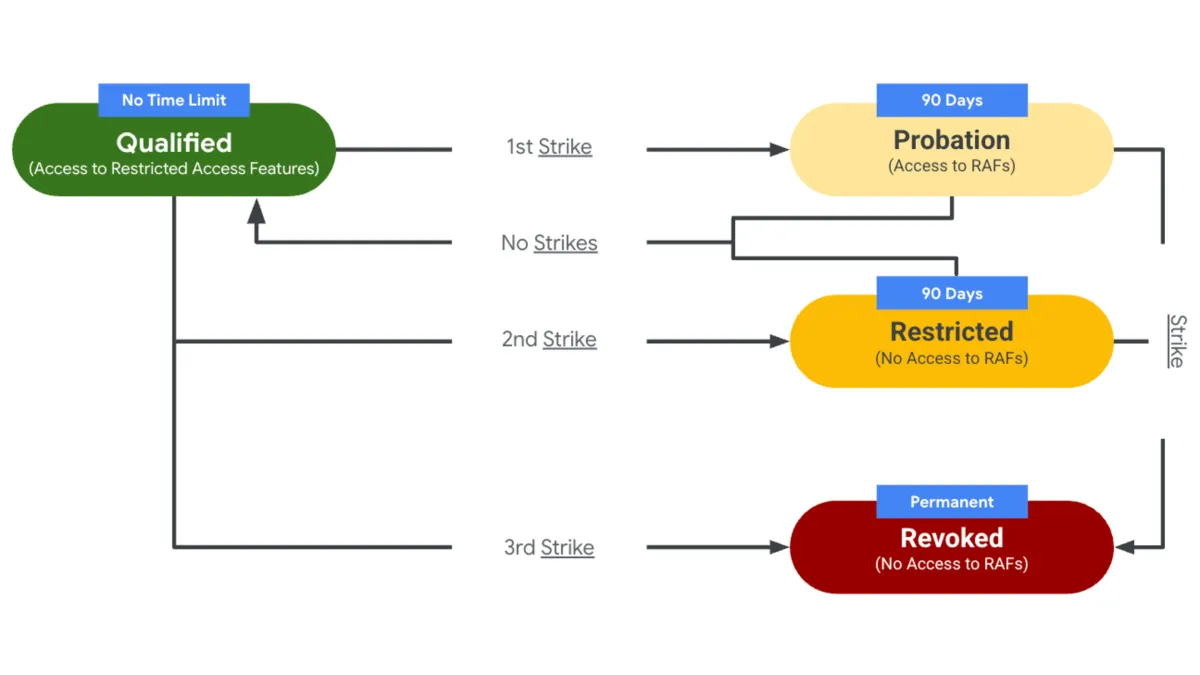
Google announced June 24, 2025, the introduction of Restricted Access Features (RAFs) for AdSense for Search, implementing a tiered access system that will limit certain advertising features based on publisher account standing within the Search Partner Network (SPN). The new framework launches August 25, 2025.
According to the announcement, "certain AdSense for Search features will have limitations depending on an account's status within the SPN." Publishers maintaining good standing may receive invitations from their account managers to enable RAFs, while those with policy violations face restricted access to advanced features.
Get the PPC Land newsletter ✉️ for more like this.
Summary
Who: Google AdSense for Search publishers and their account managers within the Search Partner Network ecosystem.
What: Introduction of Restricted Access Features (RAFs) creating tiered access to advanced AdSense for Search functionalities based on publisher compliance records and policy violation history.
When: Announced June 24, 2025, with implementation scheduled for August 25, 2025, affecting all existing and future AdSense for Search accounts.
Where: Applied globally across the AdSense for Search platform, affecting Related Search units, reporting channels, customization options, and the new click-tracking feature.
Why: To prevent policy violations, promote a healthy Search Partner Network ecosystem, and create graduated enforcement mechanisms that maintain publisher participation while restricting access to premium features based on account standing.
Feature restrictions and access levels
The RAF system categorizes multiple AdSense for Search functionalities under access restrictions. Related Search unit functionality becomes limited for non-qualified accounts, with restrictions on serving more than five suggested search terms and multiple units per page. Partner-provided terms functionality requires qualification, alongside specific customization options for Related Search units.
Technical limitations extend to styling controls. Height and width settings, font configurations, and icon customization become unavailable for restricted accounts. Reporting capabilities face significant constraints, with access limited to 500 reporting channels compared to unlimited access for qualified publishers. The system introduces click-tracking permissions as a new feature exclusively available to qualified accounts.
According to the documentation, "Google may add, remove, or modify RAFs as is necessary," indicating potential future expansions of the restriction framework.
Strike system implementation
Google implements a three-strike system affecting RAF eligibility. Any five RAF in-scope policy violations constitute one strike, while single violations deemed egregious also trigger strikes. Strike incidents remain documented for two years following the most recent reported violation.
The progression system creates escalating consequences. First strikes result in 90-day "Probation" status while retaining RAF access. Second strikes within two years trigger "Restricted" status for 90 days with complete RAF loss. Third strikes within two years result in permanent "Revoked" status with irreversible RAF access removal.
Strike expungement occurs after two years of clean records for non-revoked accounts. According to the policy, "if no strikes are documented for two full years following the previous strike, all existing strikes are removed from the account and the account's strike count is returned to zero."
Technical impact on publishers
Non-qualified accounts face specific technical limitations affecting search unit functionality. Related Search units serve maximum five suggested searches with only Google-generated terms. Multiple unit serving per page becomes unavailable, restricting monetization opportunities.
Customization capabilities experience selective enforcement. Template, background color, and font color settings remain functional, while height, width, font size, and icon settings default to standard configurations. The documentation specifies that "all other publisher customizations will be ignored in favor of the default style values."
Reporting infrastructure undergoes substantial changes for restricted accounts. According to Google, "all existing channels will be removed from the account and 500 new channels will be issued." Channel restoration occurs only upon graduation to qualified status.
Policy violation scope and enforcement
RAF-eligible policy violations encompass specific categories within AdSense for Search policies. The enforcement mechanism operates at the AdSense account level rather than individual property codes, affecting entire publisher operations rather than specific websites.
Appeals processes maintain existing structures through the Policy center. Publishers cannot directly appeal RAF strikes but may challenge underlying policy violations. Successful appeals demonstrating violation inaccuracy result in strike removal and status updates.
Account managers cannot appeal violations or strikes on publisher behalf. According to Google's guidance, "Publishers can appeal individual policy violations through the standard appeal process in the Policy center; strikes and account status cannot be appealed."
Implementation timeline and requirements
The RAF system activates August 25, 2025, with potential retroactive policy consideration. According to the announcement, "policy violations that are successfully appealed and removed from an account prior to August 25, 2025 will not be counted toward RAF status."
Existing violations may immediately impact account standings. Google plans comprehensive review of all AdSense for Search accounts on the launch date. Accounts with five or more active violations or single egregious violations start with strike status and "Probation" classification.
Publisher eligibility requires AdSense for Search interface access and account manager collaboration for RAF activation. The system introduces a collaborative approval process between publishers and Google representatives rather than automatic qualification.
Click-tracking feature introduction
RAF implementation introduces click-tracking as a new AdSense for Search capability. The feature enables publishers to monitor ad engagement through URL inclusion in AFS tags for ad click data collection. Publishers can track specific ad block identification and position data, facilitating performance analysis through independent monitoring systems.
This functionality represents a significant enhancement to publisher analytics capabilities, previously unavailable within the AdSense for Search framework. The feature addresses long-standing publisher requests for granular engagement tracking beyond standard revenue metrics.
Market implications for search advertising
The RAF system represents a fundamental shift in Google's publisher relationship management strategy. Unlike previous policy frameworks focusing on violations and suspensions, RAFs create graduated access tiers maintaining publisher participation while restricting premium features.
This approach addresses advertiser quality concerns while preserving publisher revenue streams through basic functionality maintenance. The policy change coincides with broader AdSense adjustments affecting search advertising throughout 2024 and 2025.
Search advertising publishers face increasing compliance requirements across Google's advertising ecosystem. The site-level approval process introduced March 2024 established precedent for enhanced publisher oversight, with RAF extending this framework to feature-level access control.
Publishers utilizing advanced AdSense features must now consider long-term compliance strategies to maintain access to monetization tools. The two-year strike documentation period creates extended accountability timelines affecting strategic planning for search advertising implementations.
Revenue impact considerations
RAF restrictions directly affect publisher monetization potential through feature limitations. Related Search unit restrictions reduce user engagement opportunities, potentially decreasing page views and associated advertising revenue. Multiple unit serving restrictions limit ad inventory placement options, constraining revenue optimization strategies.
Reporting channel limitations impact revenue analysis capabilities essential for optimization efforts. The reduction from unlimited to 500 channels restricts granular performance tracking necessary for strategic advertising placement decisions.
The click-tracking feature exclusive to qualified accounts provides competitive advantages in revenue optimization. Publishers maintaining qualification gain access to detailed engagement analytics unavailable to restricted accounts, creating potential performance gaps within the publisher ecosystem.
Industry context and regulatory alignment
The RAF implementation aligns with broader digital advertising industry trends toward enhanced quality control and advertiser protection. Similar tiered access systems exist across major advertising platforms, reflecting industry-wide movement toward merit-based feature access.
This framework addresses advertiser concerns about brand safety and ad placement quality while maintaining publisher participation in Google's advertising ecosystem. The graduated restriction approach provides middle-ground alternatives to complete account suspensions previously employed for policy violations.
The consent requirement expansions and policy updates throughout 2024 demonstrate Google's systematic approach to advertising quality enhancement across multiple product lines.
Technical documentation and support resources
Google provides comprehensive documentation through the AdSense Help Center for RAF implementation and compliance. Publishers can access detailed policy violation definitions and strike system explanations through dedicated support articles.
Account managers serve as primary contacts for RAF status discussions and feature access requests. The collaborative qualification process requires direct communication between publishers and Google representatives rather than automated approval systems.
Support resources include the AdSense forum and personalized help pages for publisher assistance. Google maintains standard support channels while emphasizing account manager relationships for RAF-related inquiries and status appeals.

Yield: How Google Bought, Built, and Bullied Its Way to Advertising Dominance
A deeply researched insider’s account of Google’s epic two-decade campaign to dominate online advertising by any means necessary.
Timeline
- March 4, 2024: Google introduces site-level approval process for AdSense for Search publishers
- March 27, 2024: Google updates AdSense Search policies introducing new product-integrated features
- May 1, 2024: Google updates reporting thresholds for Custom Channels and Search Styles requiring 100 clicks minimum
- May 22, 2025: Google expands display options for AdSense ad intents format
- June 24, 2025: Google announces Restricted Access Features for AdSense for Search
- August 25, 2025: RAF system goes into effect for all AdSense for Search publishers


